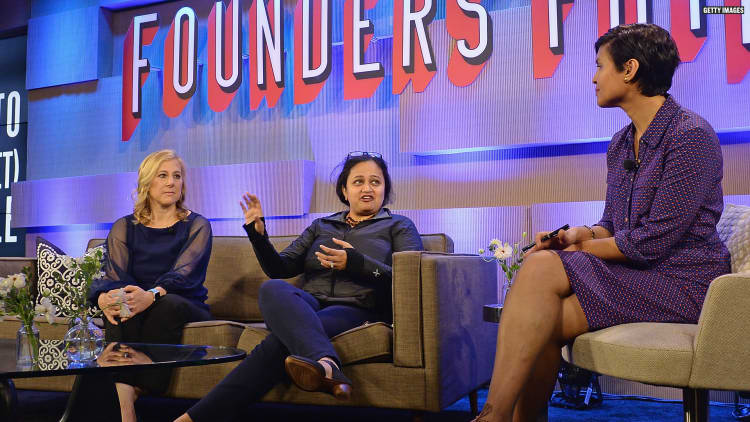Tory Burch sits at the head of a rapidly growing company. There's always a lot to do.
Launched as a small boutique in lower Manhattan in 2004, her namesake fashion business has expanded to more than 200 boutiques throughout North America. Tory Burch clothing and accessories are available at more than 3,000 department and specialty stores around the globe, and in 2016, sales topped $1 billion.
But Burch, who is unapologetically ambitious, also knows the importance of work/life balance.
"I could work long hours," said Burch, speaking at the Vanity Fair Founders Fair in New York City, but "it can really wear out a team, so I have to be aware of that."
Burch is usually in her office by about 8:30 am and works straight through until about 8 pm. She says she almost never has time for a lunch break.
"I am trying right now to find what effective work is," admitted Burch. And it's an important goal.
"Culture is everything to me and our company," she said. "[Y]ou have to constantly work on culture. And that is something we take very seriously, so work/life balance is part of that."
Burch said she has to work some weekends, but she's very careful about not overdoing it. She likes to get out of New York City, where she lives, and spend time with her family.
She also advocates logging off to promote creativity.
"I believe technology is a good thing – a great thing – but unplugging can be immensely valuable – especially if you're exploring, collecting or with other people!" she wrote recently on LinkedIn. "Being away from a screen, even for a few hours, will allow you to be more in tune with your surroundings, and be more present with family and friends."
Burch is on to something. Working around the clock is not only bad for corporate culture, it's also bad business, according to experts. Longer hours don't tend to correlate with more or better quality work.
For maximum productivity, workers need to take both breaks during the day and vacations, said Ron Friedman, a psychologist and founder of ignite80, a company that teaches strategies for working smarter.
"Studies show we have a limited capacity for concentrating over extended time periods, and though we may not be practiced at recognizing the symptoms of fatigue, they unavoidably derail our work," wrote Friedman in Harvard Business Review.
"No matter how engaged we are in an activity, our brains inevitably tire," he added.
And longer breaks are important, too, for employees to be able to recharge. "Intelligent workplaces recognize that taking time off is not a luxury. It is essential to top performance, an optimistic mindset, and full engagement," Friedman wrote.
When it comes down to it, Burch has a solution: "You put your children and family first and then everything falls into place. That's how I look at it," she told CNBC.
See also:
How a tech entrepreneur ran a 7-figure business from a bus he lived on with a wife and 3 kids
Why this Harvard grad has spent a decade making maxi pads out of banana fibers
Why one exec passed up the chance to be president of this $127 billion company



